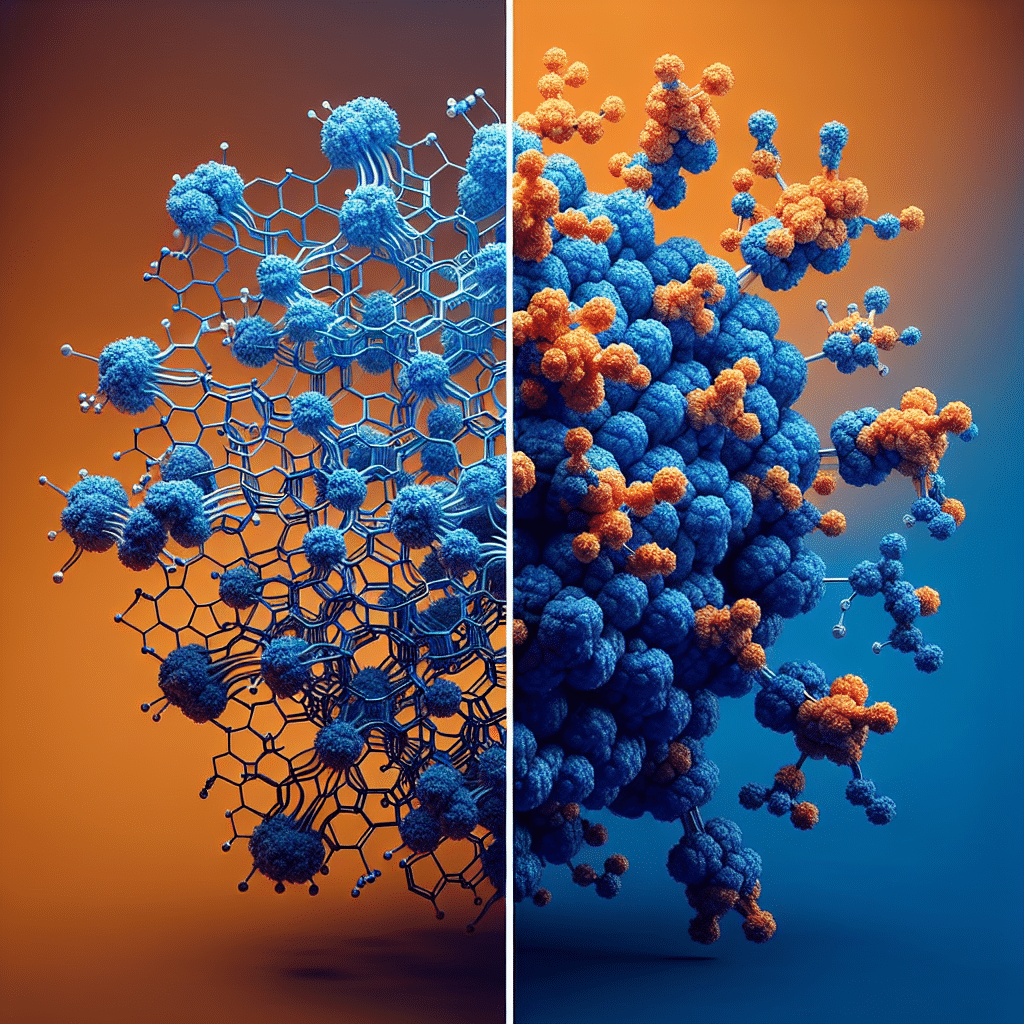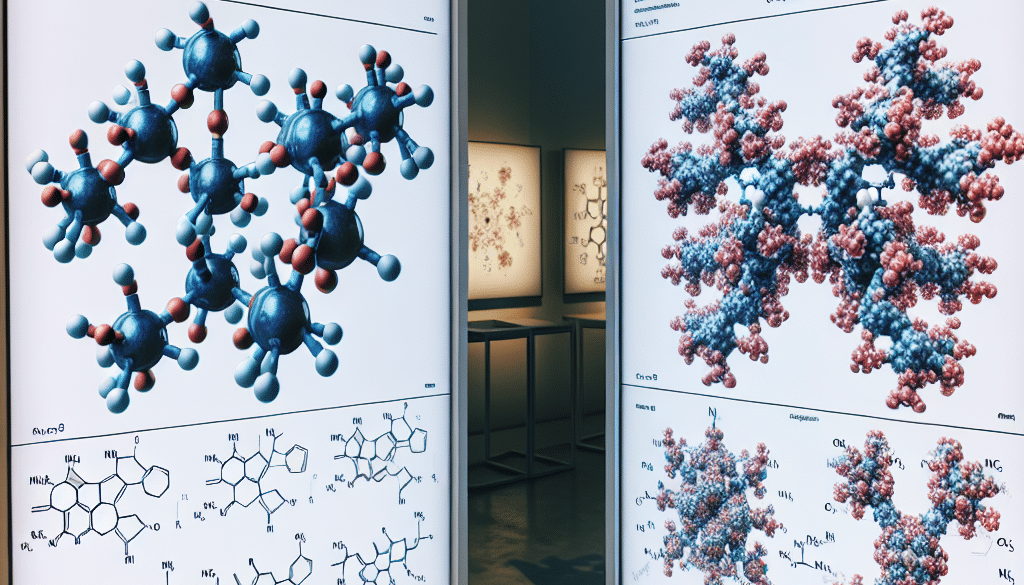Dihydronicotinamide Mononucleotide vs Nicotinamide Mononucleotide
-
Table of Contents
- Dihydronicotinamide Mononucleotide vs. Nicotinamide Mononucleotide: Exploring the Differences
- Understanding the Basics: What are DNM and NMN?
- The Role of NMN in Health and Longevity
- The Significance of DNM in Cellular Function
- Comparing DNM and NMN: Key Differences and Similarities
- Case Studies and Research Findings
- Statistics and Market Trends
- Conclusion: The Future of NMN and DNM in Health Optimization
- Discover ETprotein’s High-Quality Protein Products
Dihydronicotinamide Mononucleotide vs. Nicotinamide Mononucleotide: Exploring the Differences

As the quest for longevity and health optimization continues to gain momentum, the scientific community has turned its focus to the molecular mechanisms that underpin aging and age-related diseases. Among the molecules of interest are Dihydronicotinamide Mononucleotide (DNM) and Nicotinamide Mononucleotide (NMN), both of which play critical roles in cellular metabolism and energy production. This article delves into the differences between DNM and NMN, their biological significance, and the potential they hold for enhancing human health.
Understanding the Basics: What are DNM and NMN?
Before we explore the differences between DNM and NMN, it is essential to understand what these compounds are and how they function within the body.
- Nicotinamide Mononucleotide (NMN): NMN is a nucleotide derived from ribose and nicotinamide. It is a precursor to nicotinamide adenine dinucleotide (NAD+), a vital coenzyme found in all living cells that is involved in numerous metabolic processes, including energy production, DNA repair, and regulation of circadian rhythms.
- Dihydronicotinamide Mononucleotide (DNM): DNM is a reduced form of NMN. It is less commonly discussed in the context of supplementation but plays an important role in the redox reactions within the cell, particularly in the electron transport chain, which is a series of complexes that generate ATP, the primary energy currency of the cell.
The Role of NMN in Health and Longevity
NMN has garnered significant attention for its potential anti-aging benefits. Research has shown that NMN supplementation can boost NAD+ levels in the body, which decline with age. This decline is associated with a range of age-related conditions, including metabolic disorders, neurodegenerative diseases, and cardiovascular problems.
- Metabolic Benefits: Studies have indicated that NMN can improve insulin sensitivity and enhance energy metabolism, which are crucial for maintaining healthy body weight and preventing metabolic diseases such as diabetes.
- Neuroprotective Effects: NMN has been shown to support brain health by promoting the repair of damaged DNA and enhancing the function of neurons, potentially offering protection against neurodegenerative diseases like Alzheimer’s.
- Cardiovascular Health: By improving the health of blood vessels and reducing oxidative stress, NMN may help prevent heart disease and stroke.
The Significance of DNM in Cellular Function
While DNM has not been as extensively studied as NMN in the context of supplementation, it is nonetheless a crucial player in cellular metabolism. DNM is involved in the transfer of electrons within the mitochondria, aiding in the efficient production of ATP. This process is fundamental to maintaining cellular energy levels and supporting overall cellular health.
- Electron Transport Chain: DNM acts as an electron carrier in the mitochondrial membrane, facilitating the production of ATP through oxidative phosphorylation.
- Antioxidant Properties: DNM may also serve as an antioxidant, helping to neutralize harmful free radicals that can damage cells and contribute to aging.
Comparing DNM and NMN: Key Differences and Similarities
Although DNM and NMN are closely related, they have distinct roles within the body. Here are some of the key differences and similarities:
- Biological Function: NMN serves primarily as a precursor to NAD+, while DNM is involved in the electron transport chain as an electron carrier.
- Supplementation Potential: NMN is widely studied for its supplementation potential, whereas DNM is not commonly used as a supplement due to its reduced state and instability.
- Research Focus: The majority of research has focused on NMN due to its direct impact on NAD+ levels and its association with anti-aging benefits. DNM, while important, has not been the subject of extensive supplementation studies.
Case Studies and Research Findings
Several studies have highlighted the benefits of NMN supplementation. For instance, a study published in “Cell Metabolism” found that NMN supplementation in mice improved age-associated metabolic decline. Human studies are ongoing, with preliminary results suggesting similar benefits in boosting NAD+ levels and improving markers of metabolic health.
Research on DNM is more limited, but its role in cellular metabolism is well-established. Further studies are needed to fully understand its potential for supplementation and its impact on human health.
Statistics and Market Trends
The market for NMN supplements has been growing rapidly, driven by increasing consumer interest in anti-aging and health optimization. According to recent market analysis, the global NMN supplement market is expected to continue expanding as more research supports its health benefits.
Conclusion: The Future of NMN and DNM in Health Optimization
In conclusion, both DNM and NMN are essential components of cellular metabolism with distinct roles. NMN, as a precursor to NAD+, has shown promise in anti-aging research and is the focus of many health supplements. DNM, while less discussed, is crucial for efficient ATP production. As research progresses, we may discover more about these compounds and their potential to improve human health.
Discover ETprotein’s High-Quality Protein Products
If you’re looking to enhance your health regimen, consider exploring ETprotein’s range of protein products. ETprotein is a reputable manufacturer and supplier of organic bulk vegan proteins and L-(+)-Ergothioneine (EGT), offering high-quality, non-GMO, allergen-free options for various industries. Their products, including Organic rice protein, pea protein, and more, cater to nutraceutical, pharmaceutical, and food and beverage sectors. For more information or to sample their products, contact ETprotein today.
About ETprotein:
ETprotein, a reputable protein and L-(+)-Ergothioneine (EGT) Chinese factory manufacturer and supplier, is renowned for producing, stocking, exporting, and delivering the highest quality organic bulk vegan proteins and L-(+)-Ergothioneine. They include Organic rice protein, clear rice protein, pea protein, clear pea protein, watermelon seed protein, pumpkin seed protein, sunflower seed protein, mung bean protein, peanut protein, and L-(+)-Ergothioneine EGT Pharmaceutical grade, L-(+)-Ergothioneine EGT food grade, L-(+)-Ergothioneine EGT cosmetic grade, L-(+)-Ergothioneine EGT reference grade and L-(+)-Ergothioneine EGT standard. Their offerings, characterized by a neutral taste, non-GMO, allergen-free attributes, with L-(+)-Ergothioneine purity over 98%, 99%, cater to a diverse range of industries. They serve nutraceutical, pharmaceutical, cosmeceutical, veterinary, as well as food and beverage finished product distributors, traders, and manufacturers across Europe, USA, Canada, Australia, Thailand, Japan, Korea, Brazil, and Chile, among others.
ETprotein specialization includes exporting and delivering tailor-made protein powder and finished nutritional supplements. Their extensive product range covers sectors like Food and Beverage, Sports Nutrition, Weight Management, Dietary Supplements, Health and Wellness Products, and Infant Formula, ensuring comprehensive solutions to meet all your protein needs.
As a trusted company by leading global food and beverage brands and Fortune 500 companies, ETprotein reinforces China’s reputation in the global arena. For more information or to sample their products, please contact them and email sales(at)ETprotein.com today.














